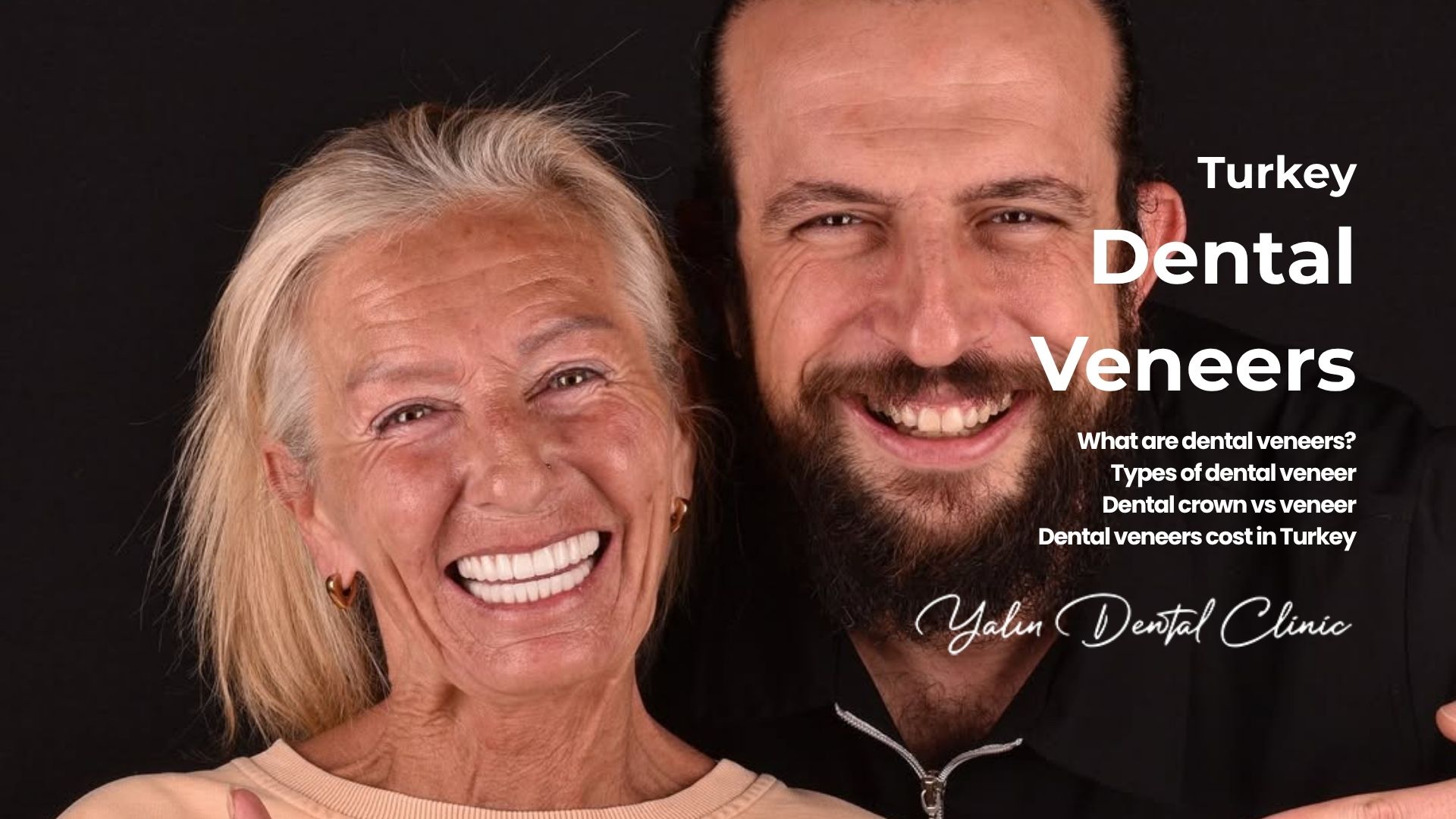
What are dental veneers?
Veneers are thin covers that stick to the front of your teeth. Like a little jacket for your tooth. It's as simple as that.
Why do people get them?
To fix a broken tooth, cover stains, close a gap, or just make their smile look better.
They're made from either porcelain or composite. Porcelain lasts longer. Composite is done quicker and cheaper.
Do they look fake?
No. A good dentist makes them look just like real teeth.
Your dentist shaves down a bit of your tooth. Not scary. It's fast, and you don't feel much.
They don't fix cavities or gum problems. They're for looks only.
If your teeth are healthy but you don't like how they look, veneers can help.
Types of dental veneer
There are mainly two types you'll hear about: porcelain veneer, composite ones and emax veneers.
Let's start with porcelain.
These are strong, smooth, and last the longest. They don't stain easily, and they look very natural. Most people who want a long-term result go with porcelain.
Next we have composite veneers.
They're quicker and cheaper. The dentist usually builds them directly on your tooth in one visit. But they're not as shiny or durable as porcelain. They may chip faster and need touch-ups more often.
Long-term or low-budget?
Porcelain for long-term, composite for low-budget.
There's also something called “no-prep veneers.”
These don't need much filing on your tooth. Brands like Lumineers fall into this group. They're thinner, but not for everyone. Your teeth need to be in pretty good shape already.
Quick tip:
If you clench your jaw or grind your teeth a lot, tell your dentist. Some veneers might not hold up well in that case.
That's the basics. You don't need to know every little brand; just know what fits your smile best.
Then emax veneers.
Emax veneers are very thin, very robust, and appear just like natural teeth. They are composed of a specific kind of ceramic that naturally reflects light.
The technique takes out less enamel, so your natural tooth stays essentially the same.
So, do you want a smile makeover that lasts a long time and doesn't scream "veneers"? You could be a good fit for Emax. Natural, powerful, and clean. This is exactly how a smile should feel.
Dental crown vs veneer
|
Dental Crown |
Dental Veneer |
|
Entire tooth (all sides) |
Front surface only |
|
For strength + aesthetics |
Mostly aesthetics |
|
For weak, damaged, or root canal-treated tooth |
For mostly healthy tooth |
|
More filing needed |
Minimal filing |
|
Very strong, lasts long |
Strong but thinner |
|
Front and back teeth |
Mostly front teeth |
|
Usually more expensive |
Often less expensive |
Depends on your tooth.
Veneers cover just the front of the tooth.
Crowns cover all around, 360°. Like a cap.
If your tooth is healthy but just looks bad (colour, shape, small chip), a veneer is enough.
But if it's badly broken, has a big filling, or had a root canal, you probably need a crown. Because veneers don't give full protection.
Looks or strength?
Veneer for looks, crown for strength.
Both look natural and white if done well.
Crowns also work for back teeth. Veneers? Not really. They're more for your smile zone.
To sum up:
Tooth still strong? Go for veneer.
Crown or veneer?
Tooth cracked or had deep work? Crown is safer.
Both can fix your smile, but they do different jobs.
Ask your dentist what your tooth needs. Not just what looks better.
Veneers teeth pros and cons
|
Pros |
Cons |
|
Instantly improves smile |
Irreversible procedure |
|
Natural and aesthetic look |
Can chip or crack over time |
|
Resistant to stains (porcelain) |
Not suitable for damaged teeth |
|
Minimally invasive |
Needs replacement after years |
|
Boosts self-confidence |
Can be expensive |
How much do veneers cost in Turkey?
Turkey is one of the most affordable countries for veneers. And no, there's no long waiting list. You can usually get an appointment in just a few days.
Porcelain veneers cost around $250 to $400 per tooth.
Composite veneers are cheaper, around $100 to $200 per tooth.
Why is there a price gap?
Porcelain takes more time, looks more natural, and lasts longer. Composite is quicker, done in one visit, and easier on your wallet.
Another reason people love Turkey? The quality. Dentists here are experienced, clinics are modern, and many speak English. Plus, it's easy to plan your treatment and trip together.
So, you get:
- Affordable prices
- Fast booking
- Skilled dentists
And yes, a better smile, without breaking the bank.
Dental veneer replacement
Over time, veneers wear out. It's normal. Most people change them after 10 to 15 years.
The surface might lose its shine. Edges can chip. Or your gums shift slightly, and the fit feels off. That's when replacement makes sense.
The process is pretty simple. Old veneers come off. Your teeth get cleaned up. Then new veneers go on.
Strange feeling at first?
Maybe a day or two. Then it feels like they've always been there.
You don't need to replace every single one unless they all need it. And with proper care, the new set stays strong for years.
Dental veneer colours
Veneers come in many shades, not just “Hollywood white.” You can choose a colour that looks super bright or something more natural. Colour depends on what fits your face, skin tone, and even your eye colour.
Some people go for the brightest shade possible. Others want something softer, like the natural white of healthy teeth. There's no “one right colour.” Your dentist helps you find the tone that feels right for you.
Can veneers change colour later?
Yes, but only slightly. Porcelain veneers don't really stain. But composite ones might darken over time, especially if you drink a lot of coffee or smoke.
Still, even porcelain can look dull if your gums recede or if your natural teeth darken underneath.
Dental veneer glue
This is the material that sticks the veneer to your tooth. It's safe, long-lasting, and made just for dental use.
It doesn't harm your tooth. In fact, it protects it by sealing everything in place.
Over time, the glue can weaken, especially if there’s pressure from grinding or if regular care is skipped.
If a veneer comes loose, the reason is usually the glue, not the veneer. Dentists just reattach it. Simple fix.
What is veneer teeth shaving?
It's the light trimming of your natural teeth to make room for veneers. Just a thin layer and often less than a millimetre.
Why?
So, the veneers fit perfectly and look natural, not bulky.
Does it hurt?
No. Dentists numb the area, and most people feel nothing. Some veneers don't even need shaving at all.
Teeth bonding vs veneers
|
Teeth Bonding |
Veneers |
|
Composite resin |
Porcelain or composite |
|
Good, but less natural look |
Very natural and bright look |
|
3-7 years last |
10-15 years last |
|
More affordable |
More expensive |
|
Single visit |
2-3 visits |
|
Minimal or none tooth shaving |
Usually required tooth shaving |
|
Best for small fixes |
Best for full smile makeover |
Bonding is a quick fix for small chips or gaps.
It's cheaper and done in one visit.
Veneers are stronger, last longer, and give a full smile makeover.
They look more natural but cost more and take more time.
Dental veneers before and after in Turkey, Antalya
Frequently Asked Questions
Are veneers permanent?
Veneers aren't forever, but they last a long time. Most people keep them for 10-15 years. But since your dentist removes a bit of enamel, you can't go back to your natural teeth. So yes, once you get veneers, you'll always need them.
They can wear out or break over time. When that happens, you just get them replaced.
How long do dental veneers last?
Usually 10 to 15 years. Good care makes them last longer.
Avoid grinding hard foods and poor hygiene.
Brush, floss, visit your dentist—simple habits, long-lasting results.
Can you eat with veneer teeth?
Yes, you can eat like normal. Veneers are strong and made for everyday use. You don't need a special diet.
But a small tip: skip biting hard stuff like ice or nuts with your front teeth. Use the back teeth instead.
Sticky candy, chewing pens, or opening things with your teeth? Avoid them. Not just for veneers, for all teeth.
Veneers don't limit your meals. Just eat smart, chew with care, and enjoy your food like always.
Can veneer teeth be stained?
No, porcelain veneers don't stain easily. That's one of the reasons people love them. Coffee, wine, and tea don't leave marks like they do on natural teeth.
But composite veneers? The're a bit more sensitive. Over time, they can pick up colour, especially if you smoke or drink lots of dark drinks.
Still, brushing well and avoiding heavy stains helps a lot. Even veneers need a little love to stay bright.
How to whiten veneer teeth
Here's the thing: veneers don't actually whiten like natural teeth. Whitening strips, pens, fancy pastes… they might work on real teeth, but not on veneers. And some can even damage the surface, making it look dull or rough over time.
But you can still make them look fresher. How?
Professional cleaning helps remove surface stains.
Polishing can bring back their shine.
Replacing old veneers is an option if they've darkened over time.
Short answer:
Can whitening toothpaste fix it?
No. But keeping your veneers clean makes a big difference.
So, if they look dull, visit your dentist. Sometimes a good polish is all they need.
Please contact us for more information.






